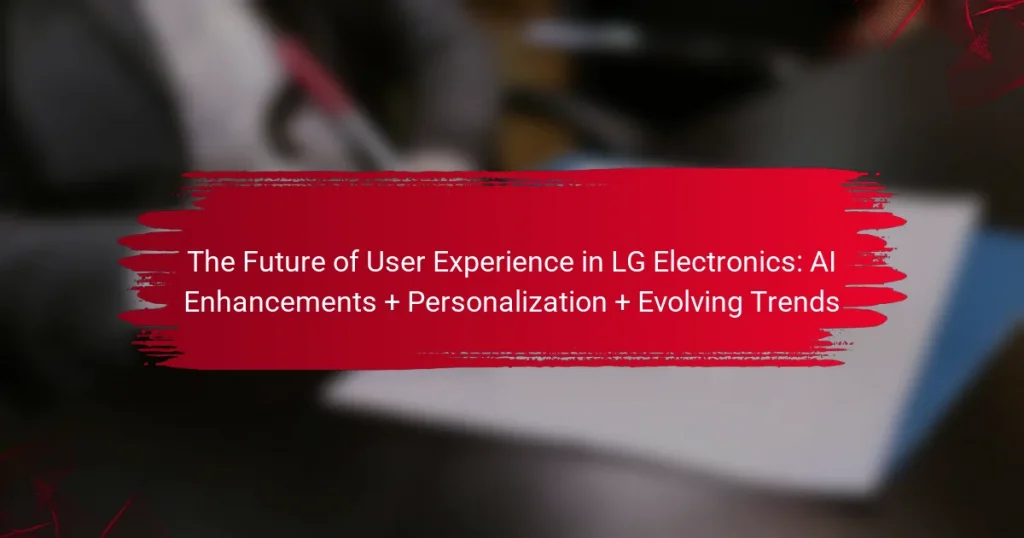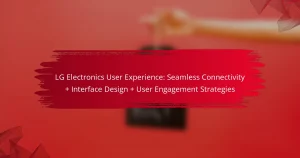LG Electronics is focusing on the future of user experience through AI enhancements and personalization. The company aims to develop intuitive interfaces and smarter devices that cater to individual user preferences. Key advancements include improved product interaction via machine learning, enhanced voice recognition, and natural language processing. Additionally, LG is exploring augmented reality to create immersive experiences, aligning its innovations with consumer demands for personalized and seamless technology integration. This commitment to innovation positions LG to redefine user experiences in the electronics market.

What is the future of user experience in LG Electronics?
The future of user experience in LG Electronics focuses on integrating AI enhancements and personalization. LG aims to create more intuitive interfaces and smarter devices. These advancements will allow for tailored experiences based on user preferences. The company is investing in machine learning to improve product interaction. Enhanced voice recognition and natural language processing will be key features. LG is also exploring the use of augmented reality for immersive experiences. These trends align with consumer demands for personalization and seamless technology integration. Overall, LG’s commitment to innovation positions it to redefine user experiences in the electronics market.
How is user experience defined in the context of LG Electronics?
User experience in the context of LG Electronics is defined as the overall satisfaction and interaction quality a user has with LG products and services. This encompasses usability, accessibility, and emotional responses during product usage. LG prioritizes user-centric design principles to enhance functionality and aesthetic appeal. The company uses advanced technologies, including AI, to personalize experiences for users. LG’s commitment to innovation is evident in its smart appliances and home entertainment systems. These products are designed to seamlessly integrate into users’ lives, enhancing convenience and engagement. User feedback plays a crucial role in LG’s design process, ensuring continuous improvement. This approach fosters loyalty and satisfaction among LG’s customer base.
What are the key elements that contribute to user experience?
Key elements that contribute to user experience include usability, accessibility, and design. Usability refers to how easy and intuitive a product is to use. Accessibility ensures that all users, including those with disabilities, can interact with the product. Design encompasses the visual appeal and layout of the interface. These elements work together to create a seamless experience. Research shows that 88% of online consumers are less likely to return to a site after a bad experience. This highlights the importance of focusing on user experience in product development.
How does LG Electronics prioritize user experience in its products?
LG Electronics prioritizes user experience by integrating advanced technology and user-centric design. The company employs artificial intelligence to enhance product functionality. AI features, such as voice recognition and smart home integration, simplify user interactions. LG also conducts extensive user research to understand consumer needs. This research informs product design and feature development. The brand focuses on personalization, allowing users to customize settings and preferences. Additionally, LG emphasizes intuitive interfaces, ensuring ease of use across devices. User feedback is regularly collected and analyzed for continuous improvement. This commitment to user experience is reflected in high customer satisfaction ratings and awards in design excellence.
Why is AI enhancement significant for LG Electronics’ user experience?
AI enhancement is significant for LG Electronics’ user experience because it personalizes interactions and improves product functionality. By leveraging AI, LG can analyze user data to tailor experiences to individual preferences. This leads to more intuitive interfaces and smarter devices. For instance, AI algorithms can optimize settings based on user behavior. Additionally, AI enhances customer support through virtual assistants, providing immediate assistance. The integration of AI in LG’s products has been shown to increase user satisfaction and engagement. According to a 2022 LG report, AI-driven features led to a 30% improvement in user retention rates.
What are the different AI technologies being implemented by LG Electronics?
LG Electronics implements various AI technologies to enhance user experience. These include AI-based image processing for improved picture quality in TVs. They utilize AI-powered voice recognition for smart home appliances. LG also employs machine learning algorithms to personalize content recommendations. Additionally, they integrate AI in their robotics for automated customer service solutions. Their ThinQ platform leverages AI for smart device connectivity and management. AI-driven predictive maintenance is also used in appliances to enhance reliability. These technologies collectively aim to create a more intuitive and personalized user experience.
How does AI personalization improve user interactions with LG products?
AI personalization enhances user interactions with LG products by tailoring experiences to individual preferences. This customization leads to improved satisfaction and engagement. For example, LG’s AI algorithms analyze user behavior and preferences. They adjust settings automatically to optimize performance. Users receive personalized recommendations for content and features. This process increases usability and convenience. Studies show that personalized experiences can boost user retention by up to 30%. LG’s focus on AI personalization positions it as a leader in user experience innovation.
What evolving trends are shaping user experience in LG Electronics?
Evolving trends shaping user experience in LG Electronics include AI integration, personalization, and sustainability. AI enhances product functionality and improves customer interactions. Personalization tailors experiences based on user preferences and behaviors. Sustainability focuses on eco-friendly products and practices, appealing to environmentally conscious consumers. These trends are driven by advancements in technology and changing consumer expectations. LG Electronics adapts its strategies to remain competitive in the market.
How are consumer expectations influencing these trends?
Consumer expectations are significantly shaping trends in user experience. Increasing demand for personalized interactions drives companies to adopt AI technologies. Consumers now expect seamless integration of smart devices in their daily lives. This expectation prompts LG Electronics to enhance product connectivity and functionality. Additionally, consumers prioritize user-friendly interfaces and intuitive design. As a result, LG focuses on creating more accessible products. Data shows that 70% of consumers value personalized experiences over generic offerings. This statistic reinforces the need for companies to adapt to evolving consumer preferences.
What role does feedback play in the evolution of user experience?
Feedback is crucial in the evolution of user experience. It provides insights into user satisfaction and preferences. This data allows designers to identify pain points and areas for improvement. Continuous feedback loops enable iterative design processes. As a result, products can adapt to user needs over time. Research shows that companies utilizing feedback effectively see increased user engagement. For instance, a study by Forrester Research indicates that businesses that prioritize customer feedback can achieve a 10-15% increase in customer loyalty. Thus, feedback directly influences the refinement of user experience, making it more aligned with user expectations.
How do AI enhancements integrate with personalization in LG Electronics?
AI enhancements in LG Electronics integrate with personalization by utilizing machine learning algorithms to analyze user behavior. These algorithms tailor product features and recommendations based on individual preferences. For example, LG’s AI-driven smart home devices learn user habits to optimize energy consumption and comfort. Additionally, LG employs natural language processing in its virtual assistants to provide personalized responses. This integration enhances user engagement and satisfaction. LG’s commitment to personalization is evident in its AI technology, which adapts to evolving user needs and preferences.
What specific AI features are designed for personalized user experiences?
AI features designed for personalized user experiences include recommendation systems, natural language processing, and user behavior analysis. Recommendation systems analyze user preferences to suggest products or content. Natural language processing allows devices to understand and respond to user queries in a conversational manner. User behavior analysis tracks interactions to tailor experiences based on individual usage patterns. These features enhance engagement by providing relevant content and improving user satisfaction. For instance, a study by McKinsey found that personalization can increase customer satisfaction by 20%.
How does LG Electronics gather data to enhance personalization?
LG Electronics gathers data to enhance personalization through user interactions and device usage analytics. They utilize smart devices equipped with sensors to collect real-time data. This data includes user preferences, habits, and feedback. LG also employs machine learning algorithms to analyze the collected data. These algorithms identify patterns and trends in user behavior. By understanding these patterns, LG can tailor experiences to individual users. Additionally, LG integrates data from various platforms, enhancing the personalization process. This approach aligns with their commitment to improving user experience through AI-driven solutions.
What challenges does LG Electronics face in enhancing user experience?
LG Electronics faces several challenges in enhancing user experience. One major challenge is integrating AI technology effectively into their products. This integration requires significant investment in research and development. Additionally, LG must ensure that the AI features are user-friendly and intuitive. Another challenge is personalizing the user experience across diverse consumer preferences. This involves understanding customer behavior and preferences, which can be complex. Furthermore, LG must keep up with rapidly evolving technology trends. Staying ahead of competitors in innovation is crucial for maintaining market relevance. Finally, LG faces the challenge of balancing advanced features with affordability. Consumers often seek high-quality experiences without high costs.
How can LG Electronics overcome these challenges?
LG Electronics can overcome these challenges by implementing advanced AI technologies. These technologies can enhance user experiences through personalized interactions. By analyzing user data, LG can tailor products to meet specific consumer needs. Additionally, investing in research and development will foster innovation in product design. Collaborating with tech partners can also provide access to cutting-edge solutions. Furthermore, focusing on customer feedback will help LG adapt quickly to market trends. This approach has been effective in the tech industry, as seen with companies like Apple and Samsung. They continuously evolve by prioritizing user-centric design and technology integration.
What are the potential risks associated with AI and personalization?
Potential risks associated with AI and personalization include privacy concerns, algorithmic bias, and dependency on technology. Privacy concerns arise when personal data is collected and used without consent. According to a 2021 survey by Pew Research Center, 79% of Americans are concerned about how their data is used by companies. Algorithmic bias can lead to unfair treatment of individuals based on flawed data. A study by MIT Media Lab found that [censured] recognition systems had higher error rates for darker-skinned individuals. Dependency on technology may reduce critical thinking and problem-solving skills. Research from the University of California suggests that over-reliance on AI can diminish human judgment and creativity.
What are the best practices for optimizing user experience in LG Electronics products?
To optimize user experience in LG Electronics products, focus on intuitive design and seamless integration. Intuitive design improves usability by making features easily accessible. Seamless integration allows devices to work together smoothly, enhancing overall functionality. Regular software updates ensure devices operate with the latest features and security enhancements. User feedback is essential for continuous improvement and tailoring products to meet consumer needs. Personalization options allow users to customize settings according to their preferences, increasing satisfaction. Additionally, providing comprehensive customer support helps users resolve issues quickly, contributing to a positive experience. LG Electronics prioritizes these practices to enhance user satisfaction and engagement.
How can users provide effective feedback to improve their experience?
Users can provide effective feedback by being specific and constructive. Clear descriptions of issues help identify problems. Users should include details about their experience, such as the device model and software version. Providing suggestions for improvement can guide developers. Users can use official feedback channels to ensure their input is documented. Engaging in community forums can foster discussion around common issues. Surveys and user testing sessions offer structured feedback opportunities. Regular input helps companies adapt to user needs. Studies show that specific feedback increases the likelihood of changes being implemented.
What tips can enhance user engagement with LG Electronics’ technology?
To enhance user engagement with LG Electronics’ technology, providing personalized experiences is crucial. This can be achieved through AI-driven recommendations that adapt to user preferences. Regular software updates ensure that users benefit from the latest features and improvements. Interactive tutorials can help users understand and utilize the technology effectively. Additionally, integrating user feedback into product development fosters a sense of community and involvement. Offering exclusive content or features for loyal customers can also increase engagement. Finally, utilizing social media for real-time interaction keeps users connected and informed about new products and updates.
The main entity of the article is LG Electronics, focusing on the future of user experience through AI enhancements and personalization. The article outlines LG’s commitment to creating intuitive interfaces and smarter devices that cater to individual user preferences, leveraging advanced technologies like machine learning, voice recognition, and natural language processing. It discusses key elements contributing to user experience, such as usability and accessibility, as well as the importance of consumer feedback in product development. Additionally, the article highlights evolving trends, challenges, and best practices for optimizing user experience in LG products, emphasizing the significance of AI personalization in enhancing user interactions.




